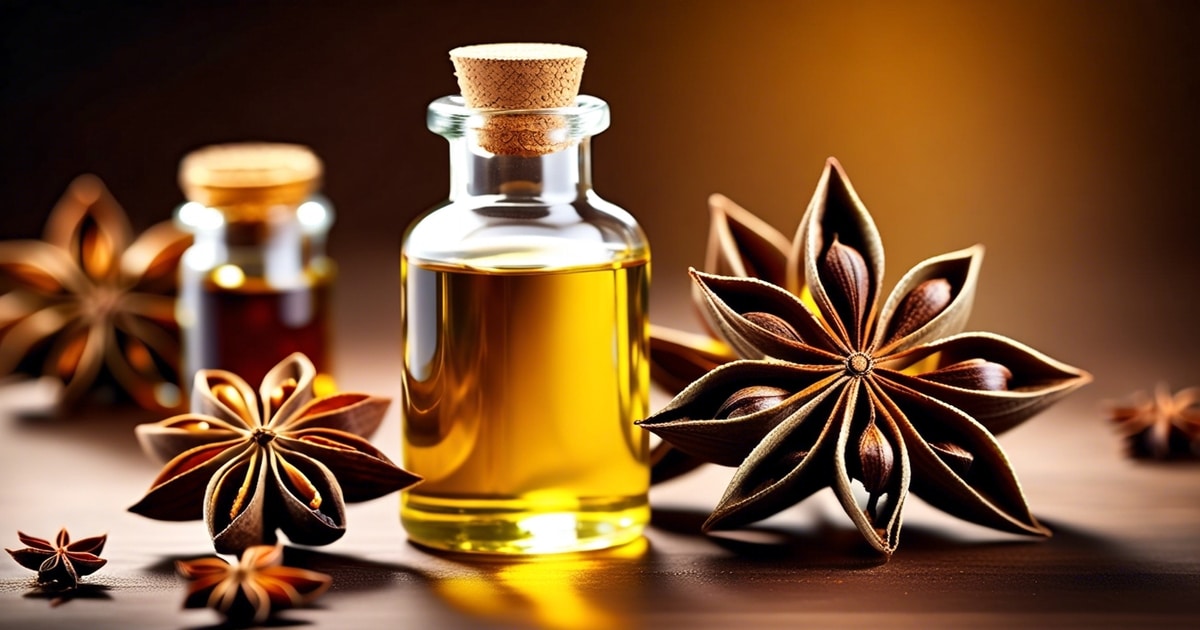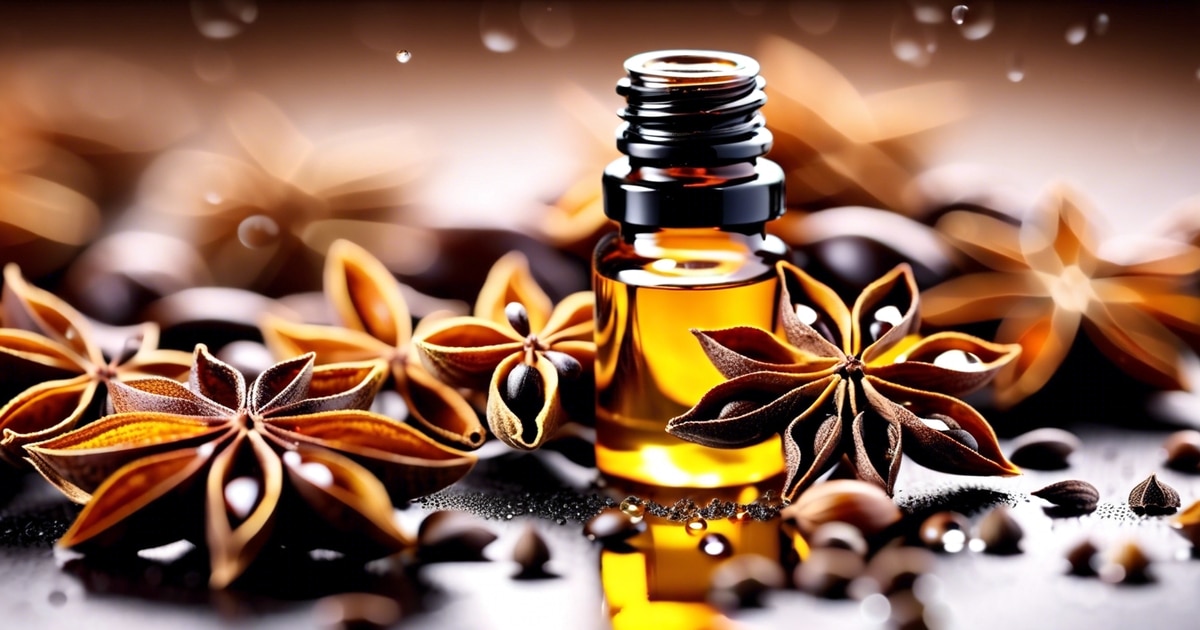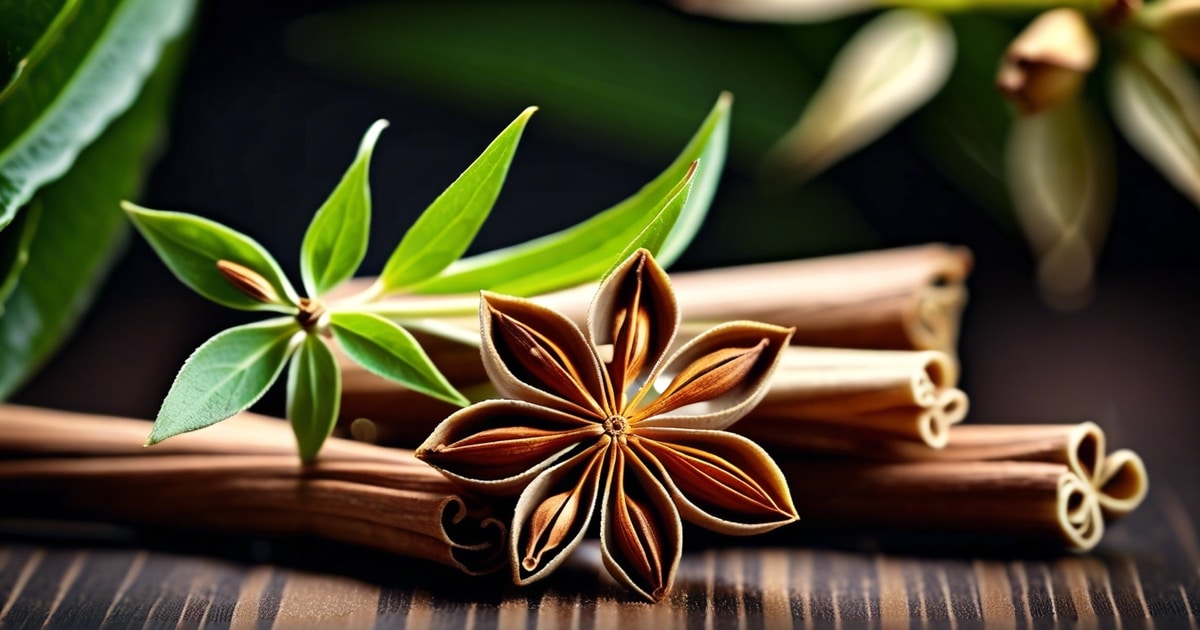Key Takeaways
-
Incorporate anise essential oil in your relaxation routine to benefit from its calming properties.
-
Utilize anise essential oil in aromatherapy for its therapeutic effects, such as aiding digestion and relieving stress.
-
Harness the aromatic properties of anise essential oil to enhance mood and promote emotional well-being.
-
Experiment with various methods of using anise essential oil in aromatherapy, such as diffusion or topical application.
-
Explore suggested uses and recipes for anise and essential oils, like creating a relaxing bath blend or a soothing massage oil.
-
Prioritize safety precautions when using anise essential oil, including proper dilution and patch testing to avoid adverse reactions.
Benefits of Anise Essential Oil for Relaxation
Stress and Anxiety Relief
Anise aromatherapy, using essential oils like anise oil, is known for its calming properties. The scent of anise can help reduce stress and alleviate anxiety, creating a sense of peace.
Using an inhaler with an essential oil can be a convenient way to experience its relaxing benefits throughout the day. Inhaling the soothing aroma can directly impact your mood, helping you feel more at ease.
Better Sleep Promotion
The gentle fragrance of anise oil promotes relaxation, making it beneficial for improving sleep quality. Incorporating anise essential oil into your bedtime routine through diffusers or pillow sprays can create a serene atmosphere conducive to restful sleep.
An effective method is adding a few drops of anise oil to a diffuser before bedtime. This allows the calming scent to fill the room, signaling your brain that it’s time to unwind and prepare for sleep.
Therapeutic Properties of Anise Oil

Muscle Cramp Relief
Anise oil, derived from the anise plant, contains antispasmodic properties. This means it can help alleviate muscle cramps and spasms. When massaged onto the affected area, anise oil can relieve the muscles.
-
Helps relieve muscle cramps and spasms
-
Can be used through massage for the best results
Respiratory Support
The expectorant properties of anise oil make it effective in addressing respiratory issues like coughs and congestion. Inhaling steam with a few drops of anise oil added to hot water can help clear phlegm and ease breathing.
-
Alleviates coughs and congestion
-
Inhalation through steam is recommended for respiratory benefits
Digestive Aid
Known for its digestive benefits, anise oil aids digestion by promoting the release of digestive enzymes. When consumed or applied topically on the abdomen, it helps reduce bloating and gas discomfort after meals.
Aromatic Properties and Mood Support
Uplifting Aromatherapy Benefits
Anise oil, with its licorice-like scent, is a powerful mood enhancer. This sweet aroma can uplift spirits and induce feelings of happiness. When used in aromatherapy, anise oil can be like a ray of sunshine on a cloudy day, boosting your mood instantly.
The aromatic properties of anise oil are not just about creating a pleasant scent; they also play a crucial role in supporting mental clarity and improving focus. Imagine it as a gentle nudge that helps you concentrate better and enhances your cognitive abilities without harsh side effects.
Emotional Balance Through Scent
In the realm of aromatherapy, anise oil stands out for its unique ability to alleviate feelings of depression and promote emotional balance. Just like certain songs can evoke memories or emotions, the scent of anise oil can soothe your mind and create harmony within yourself.
Methods of Using Anise Essential Oil in Aromatherapy
Inhalation
Inhaling anise essential oil can quickly induce relaxation. Adding a few drops to a diffuser creates a calming atmosphere. Alternatively, inhale directly from the bottle for instant relief. This method is perfect for unwinding after a long day or when feeling stressed.
Anise oil’s aroma has soothing properties that help alleviate tension and promote calmness. Inhaling the scent allows it to reach your olfactory system, triggering feelings of relaxation. It’s an excellent way to effortlessly incorporate aromatherapy into your daily routine.
Massage
Using anise oil for massages is another effective way to harness its benefits. By diluting the essential oil with a carrier oil like coconut or almond oil, you can create a blend perfect for soothing massages. Massaging this mixture onto your skin helps relieve muscle tension and provides an overall sense of relaxation and well-being.
Suggested Uses and Recipes for Anise Oil
DIY Room Spray
Create a refreshing room spray with anise oil. Mix it with water, lavender, or citrus oils for a delightful aroma. Use it to freshen up your living spaces naturally.
For instance:
-
Blend 5 drops of anise oil, 10 drops of lavender oil, and 1 cup of water in a spray bottle.
-
Shake well before each use and spritz around the room to enjoy the uplifting scent.
Relaxing Massage Blend
Blend anise oil with lavender and chamomile oils for a soothing massage blend. This combination can help alleviate muscle tension and promote relaxation after a long day.
Consider:
-
Mix 2 tablespoons of carrier oil with 3 drops of anise oil, 4 drops of lavender oil, and 3 drops of chamomile oil.
-
Gently massage the blend onto tense areas for a calming effect on both body and mind.
Sleep Aid Pillow Mist
Craft a pillow mist using anise oil and lavender to enhance sleep quality. Spraying this mixture on your pillow can create a tranquil environment conducive to restful sleep.
Try this recipe:
-
Combine 8 drops of anise oil, 5 drops of lavender oil, and distilled water in a small spray bottle.
-
Shake well before use; lightly mist your pillowcase before bedtime to enjoy its soothing benefits.
Safety Precautions for Using Anise Essential Oil
Dilution for Skin Application
When using an essential oil, it’s crucial to dilute it before applying it to the skin. This helps prevent any potential irritation or sensitization reactions. Mixing a few drops of anise oil with a carrier oil like coconut or almond oil is recommended.
Always perform a patch test before widespread use on the skin. Apply a small amount of the diluted mixture on your forearm and wait 24 hours to check for any adverse reactions.
-
Dilute anise oil before applying
-
Perform a patch test first.
Consultation for Specific Groups
Certain groups, such as pregnant women, nursing mothers, and children, should seek advice from a healthcare professional before using anise aromatherapy products. These individuals may have specific health conditions that could be affected by using anise essential oil.
-
Pregnant/nursing women & children consult healthcare providers.
-
Potential impact on certain health conditions
Allergy Considerations
If you have allergies to plants in the Apiaceae family, like fennel or celery, it’s best to avoid using anise essential oil altogether. Cross-reactivity between these plants can trigger allergic responses in sensitive individuals.
Potential Side Effects and Shelf Life of Anise Oil
Skin Irritation and Allergic Reactions
Anise oil, while beneficial in aromatherapy, can lead to skin irritation or allergic reactions for some people. To prevent this, performing a patch test before using the oil is crucial. Apply a small amount on your skin and wait to observe any adverse reactions.
-
Pros:
-
Helps identify potential skin sensitivity
-
Prevents widespread allergic reactions
-
Cons:
-
May cause temporary discomfort
-
Requires extra time before full application
Extending Shelf Life
Proper storage is key to ensuring that your anise essential oil remains potent for longer periods. Keep the oil in a cool, dark place away from direct sunlight exposure. This can extend the shelf life of anise oil up to two years.
-
Store: Keep in a cool, dark place.
-
Avoid Direct sunlight exposure.
-
Benefit: Maintains potency for up to two years.
Organic Anise Seed Essential Oil Variations

Benefits of Organic Anise Seed Essential Oil
Organic anise seed essential oil is sourced from organically cultivated anise seeds, avoiding synthetic pesticides and fertilizers. This ensures a higher-quality product free from harmful chemicals that may have adverse effects. You support sustainable farming practices and environmental well-being by choosing the organic variation.
Organic anise seed essential oil offers numerous benefits over non-organic options. It provides a purer oil form without any traces of synthetic substances or toxins. The cultivation process adheres to strict organic standards, promoting a healthier final product for consumers.
Using Organic Anise Seed Essential Oil in Aromatherapy
In aromatherapy, organic anise seed essential oil blends seamlessly with other oils to create unique and beneficial combinations. These oil blends can enhance relaxation, promote better sleep, alleviate stress, or boost focus and concentration during work or study sessions.
When incorporating organic anise seed essential oil into your aromatherapy routine, consider blending it with lavender for a calming effect before bedtime. Alternatively, mix it with peppermint for a refreshing scent that can help increase alertness and mental clarity throughout the day.
Final Remarks
You’ve now uncovered the incredible benefits, properties, and safety measures surrounding an essential oil. Anise oil can be a game-changer in your aromatherapy routine from relaxation to mood support. Remember, a little goes a long way with this potent elixir. Mix it up, experiment with blends, and find what works best. Safety first, though! Always dilute and patch-test before full-on indulgence.
So, dive into the world of anise aromatherapy with confidence. Let its aromatic embrace whisk you away to tranquility and rejuvenation. Your well-being deserves this sweet escape. Embrace the power of anise, and let its essence transform your self-care rituals. Happy blending!
Frequently Asked Questions
Is anise essential oil safe for everyone to use in aromatherapy?
Anise essential oil is generally safe when used properly, but it’s not recommended for pregnant women, children, or individuals with certain medical conditions. Always do a patch test and consult a healthcare provider before using it.
How can anise essential oil benefit relaxation during aromatherapy sessions?
The soothing properties of anise essential oil can help calm the mind and body, promoting relaxation and reducing stress levels. When diffused or applied topically (diluted), its aromatic compounds can create a tranquil atmosphere conducive to unwinding.
What are some common methods of using anise essential oil in aromatherapy practices?
You can enjoy the benefits of anise essential oil through methods like diffusion, inhalation from a tissue or cotton ball, adding it to bath water, or blending it with carrier oils for massage. Each method offers unique ways to experience its therapeutic effects.
Are there any specific recipes that incorporate anise essential oil for different purposes?
Certainly! Anise oil blends well with other oils like lavender or peppermint for various purposes. For example, mixing anise with lavender and coconut oil could create a relaxing massage blend. Experimenting with different combinations allows you to customize your aromatherapy experience.
How long does organic anise seed essential oil typically last before expiring?
When stored correctly in a cool, dark place away from sunlight and heat sources, organic anise seed essential oil usually maintains its potency for about 2-3 years. However, always check the manufacturer’s guidelines on shelf life recommendations for optimal usage.

